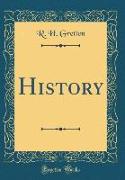History (Classic Reprint)
BücherAngebote / Angebote:
Excerpt from HistoryIt signalised a change in the historian's attitude towards his material, such as could not have been produced without recon sideration of the point of view of historical study, yet left unchanged the philosophical conception of history, and the sphere of history in the range of the human intellect. It affected method, but not outlook Now be tween a change in method and a change in out look there is this distinction - that the one may spring wholly from the spirit of scholarship and study, whereas the other must be caused by a different spirit. It is perfectly possible to con ceive of an historian, from no other prompting than that given by a scholarly mind confronted with certain age-long versions of the world's past, being moved to put them all to the test, and enquire if there be not other facts to take into account, or discoveries to be made, which would modify tradition. But a man who asks himself What is the point of contact between history and the life of his time - what is the place of history in the human mind - is bringing a different impulse to bear, an impulse not of scholarship, but of life and experience. Of course the historian in all ages has in some sense asked himself what is the purpose of history. But no searching change had passed over the schools when Macaulay's answer to the question could be that history imposes general truths onthe mind by a vivid representation of characters and incidents - an answer'echoed even in our own day by Lord Rosebery's view of history as the treasure-house of human biography, and therefore of noble models and splendid inspira tion. Such answers could not possibly be given by any one contemplating the style and aims of history at the present moment. The conclusion he would be more likely to draw would be that the value of historical knowledge lay in its effect upon our response to the problems of our own time, upon our mental vision in general, and our intellectual reaction to every stimulus of infor mation and criticism. In other words, history is for the first time genuinely looking backwards. Formerly the historian planted himself imagif natively at some point in the past, and worked forwards. It was not by an accident that certain people were moved to print the date Blat the opening of the Bible, or 764. B.c. At the be ginning of a Roman History. It was essential to their point of view that they should have a defi nite place at which to set out upon their travels. The modern historian finds that definite place in his own day. He does not transport himself to a past period, and work towards his day. Look ing backwards, he singles out the significant features of the past, and it is of less consequence to him than it was to his predecessors to date events. Their vitality is not in themselves, butin the spark Of fire with which they respond to the search-lights. This change in outlook was later than the change in method to make its appearance and its progress is less easy to trace, because it has not been continuous. A change mainly affecting the spirit of scholarship could proceed, once it had begun, by its own momen tum. A change in outlook was subject to the ebb and ¿ow of the current of civilised thought, to the checks and advances communicated to it by social' and political movements. It is, how ever, possible to find in the work of Adam Smith the starting-point of a line of development which is just traceable through the work of Buckle and Lecky to a kind of cul - de-sac in John Richard Green's Short History of tine English People, and to the more active in¿uence of Karl Marx.About the PublisherForgotten Books publishes hundreds of thousands of rare and classic books. Find more at www.forgottenbooks.com
Folgt in ca. 10 Arbeitstagen
